by Mark Brinkerhoff
Today we celebrate the 50th birthday of one of the best, most criminally-underrated actresses in Hollywood/by Hollywood: Anne Celestia Heche.
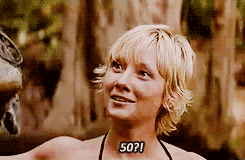
Born not far from Cleveland, Ohio on this date, Heche had an unfortunately troubled family life and a hardscrabble upbringing that have been well-chronicled, including in her own 2001 memoir. And while her much-publicized relationship with Ellen Degeneres is surely the first (if not only) thing many think of when thinking of her, this is a tribute to Heche as an actress—not a re-litigation of an awfully quaint, pre-social media public spectacle surrounding a 20-plus-year-old relationship. Call her crazy if you will, call her untalented you may not.
When did you (if you did) first take notice of her? For me, a noted stan, it must’ve been around 1989...
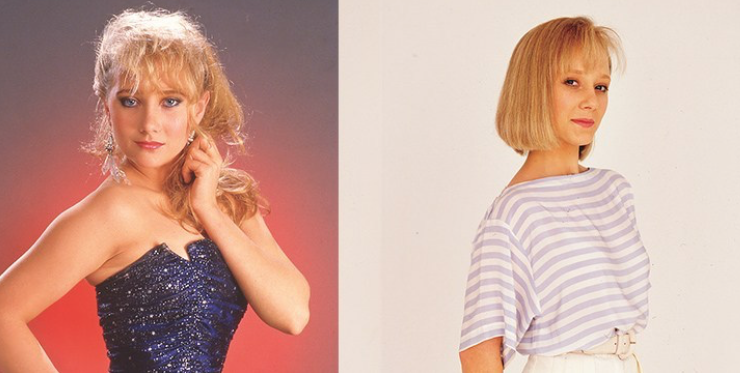 as twins on "Another World"
as twins on "Another World"
Yep, my eyes have been fixed to the screen, big and small, when she’s on it, ever since Heche doubled up on the then-long-running soap opera, Another World.
Yes, in one of the most enduring daytime soap tropes, a teenage Heche played twins, “bad” Vicky and “good” Marley, deliciously chewing scenery and winning an Emmy in the process. After four taxing years of doing five episodes a week, she set off for bigger, better opportunities in Hollywood.
The early ‘90s saw Heche toil in a series of one-off guest spots (Murphy Brown, The Young Indiana Jones Chronicles) and small parts in made-for-TV movies (Against the Wall, O Pioneers!). Not until 1994 did I next take real notice of her, namely, as the villain’s daffy sidekick, in the movie, Milk Money; followed by her supporting role opposite John Goodman in the (very good) TV movie, Kingfish: A Story of Huey P. Long.
While Heche had appeared in a film or two—I don’t remember her in I’ll Do Anything, but does anybody remember I’ll Do Anything?—it wasn’t really until 1995/96 that she emerged in impactful roles, in memorable ways. There was the banker-by-day/hooker-by-night (with a lesbian twist) in the ill-fated Wild Side; an early-ish incarnation of the “manic pixie dream girl” in the independent film, Pie in the Sky; Demi Moore’s character’s sacrificial friend in The Juror—all culminating in the one-two punch of Walking and Talking, Nicole Holofcener’s winning feature-film debut, and the provocative (for its time—and ours?), Cher-directed If These Walls Could Talk for HBO. She’s excellent in each, and purportedly got cast in her big breakthrough (hang tight) on the strength of Walking and Talking, which premiered at Sundance. It was clear this lady was going places.
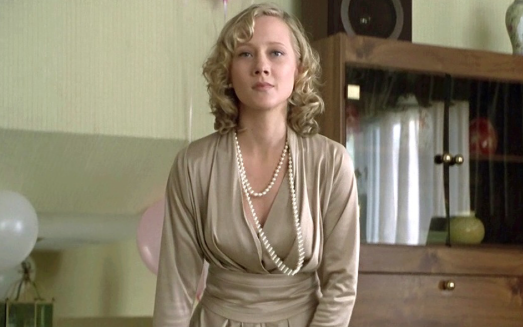 Anne Heche in Donnie Brasco (1997)
Anne Heche in Donnie Brasco (1997)
1997 would be the Year of Anne Heche, so to speak. She dazzled in that winter’s Donnie Brasco (seriously, so good), graduated to leading lady in the big-budget Volcano (cheesy, but fun), and closed out the year in a much-lauded role opposite heavyweights, Dustin Hoffman and Robert De Niro, in Barry Levinson’s Wag the Dog. In the midst of it all Heche got cast in her biggest role yet, opposite the biggest movie star in the world. Meanwhile, her personal life began to take center stage when she became one half of the most famous gay couple in America/the world. Needless to say, Heche was, by that point, a household name.
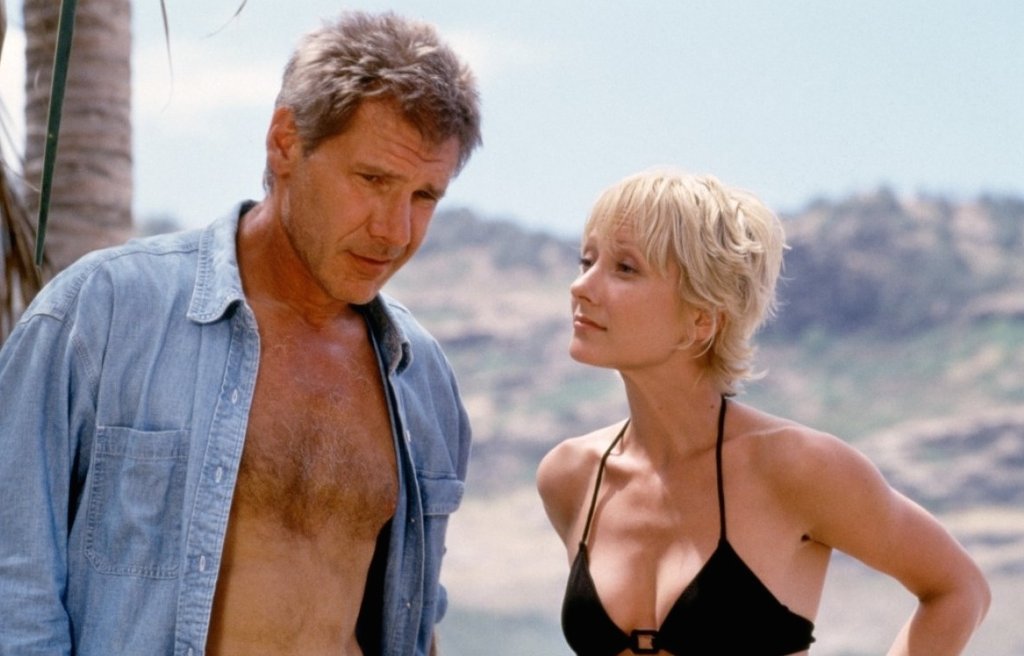 with Harrison Ford in Six Days Seven Nights (1998)
with Harrison Ford in Six Days Seven Nights (1998)
Six Days, Seven Nights arrived on a sea of publicity—and a fair amount of will-this-work curiosity—in mid-’98. Despite being in many ways middling, full of hoary clichés (opposites attract) and tired tropes (pirates, really?), this deserted-island romcom swims rather than sinks on the moxie of Heche, who sparks an easy, enviable chemistry with the not-always-on-fire Harrison Ford. You can see why he endorsed her casting over the likes of bigger stars like Meg Ryan and Uma Thurman. Heche is sassy and sexy, sensible yet spunky. That the film ultimately didn’t connect with (most) critics or audiences is no fault of hers. (Hell, I even own it on DVD.)
Heche hit a high-water mark later that summer in Return to Paradise (sadly, the end of her leading-lady days), which she chased with the frankly impossible task of recreating Marion Crane. Which leads me to a recurring theme throughout her career: that she is the best thing about many, many (too many) films—from the misbegotten, shot-for-shot remake of Psycho, to the sausage fest that is Cedar Rapids.
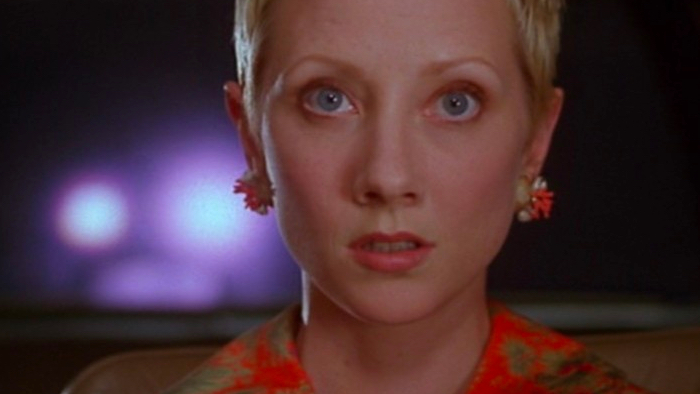 Anne Heche in Psycho (1998)
Anne Heche in Psycho (1998)
Heche has a face made for film: a wide-eyed, expressive and, you could say, expressionist face. Combined with her under-tapped flair for romcom, physical comedy (see: her multi-episode arc on Ally McBeal), it’s easy to imagine her as a movie star in the silent era—perhaps more so than in any other period of cinematic history.
Unlike several contemporaries, such as fellow newly 50-somethings, Cate Blanchett and Renée Zellweger, Heche is oft-overlooked and has gotten short shrift despite over-delivering time and time again. In between stints on TV dramas (Everwood, Nip/Tuck) and headlining short-lived series (Men in Trees, Save Me), she elevated the already-amazing Birth, scored an Emmy nod for Gracie’s Choice, and did a Tony-nominated star turn on Broadway in the recently revived Twentieth Century. Heche was typically excellent in the HBO series, Hung, and, more recently, in Catfight, opposite Sandra Oh. (P.S. Where is her Killing Eve?)
Of course there was never any guarantee, with or without her tabloid relationship(s) or brief late ‘90s heyday, that Heche would’ve gotten more A-list, higher-caliber roles. (Hollywood, after all, so rarely knows what to do with an idiosyncratic talent like hers.) But it is poignant to think of the kind of career she could have, should have, and hopefully still may have.
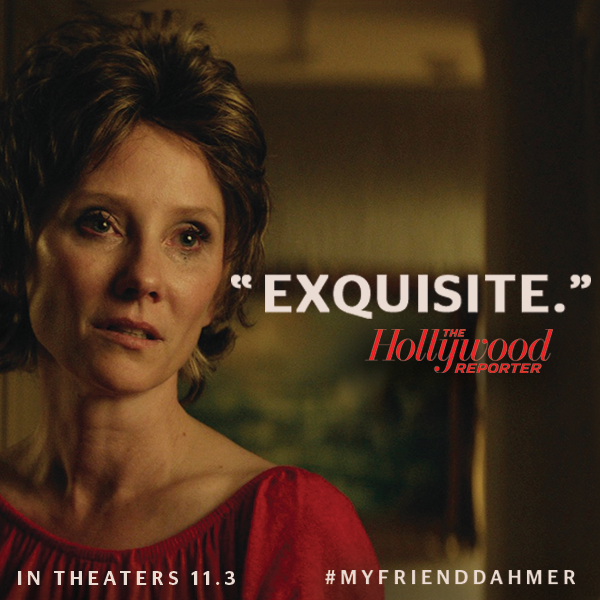 Anne Heche in My Friend Dahmer (2017)
Anne Heche in My Friend Dahmer (2017)
Although lately seemingly consigned to procedural dramas on NBC, Heche does pop up occasionally in independent films, most notably last year’s My Friend Dahmer and, as the wife of Sam Rockwell’s character, in this spring’s The Best of Enemies. Is there, in our current age of Peak TV, with its endless well for creative content, better/more in store for Heche? Who knows. As she enters her 50s, we can hope though that the parts, the characters, rise to the level of one of our finest character actresses working today.
Catfight is streaming on Netflix. Cedar Rapids is now on Cinemax. Hung is streaming on Amazon Prime and, along with My Friend Dahmer, Psycho (1998), and Volcano, also available on HBO.